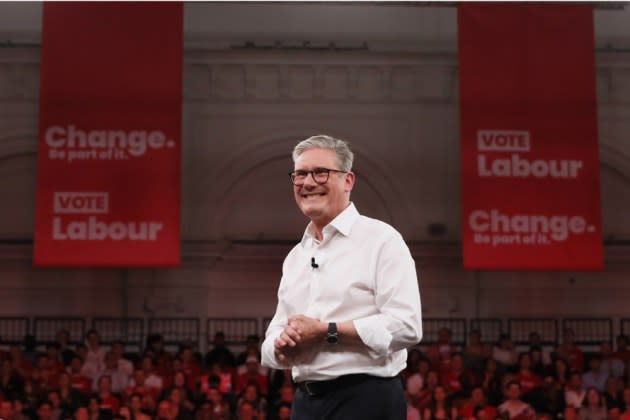U.K.’s Labour Party Wins Huge Election Victory, Keir Starmer to Become Next Prime Minister

The Labour Party has secured a decisive landslide victory in the U.K.’s general election, marking a shift in the country’s political dynamics after 14 years of Conservative rule.
With only a few votes left to be counted on Friday morning, Labour, led by Keir Starmer, has won 412 seats, well above the 326 required for a majority in the 650-seat House of Commons, the U.K.’s lower chamber of commerce. The Conservatives, meanwhile, dropped to a historic low of 119, with numerous major politic names and cabinet members losing their seats, including former Prime Minister Liz Truss.
More from Variety
Starmer will soon be sworn in as Prime Minister, moving the U.K. toward the political center ground following years of increasing shifts to the right by the Conservatives. Its leader and outgoing Prime Minister Rishi Sunak has already conceded defeat and accepted responsibility for his party’s worst election loss in history. The Liberal Democrats are now the third biggest party, winning 71 seats.
Much of the Conservative’s demise lay at the hands of the right-wing Reform Party, led by Donald Trump ally Nigel Farage, which ate into its voter base and made huge gains, echoing the rise of populist and anti-immigration parties across Europe. After several attempts over the years, Brexit champion Farage is now finally a member of Parliament, winning one of four Reform seats (its large share of the overall vote didn’t translate into Parliamentary power due to the U.K.’s first-past-the-post, winner-takes-all voting system).
But despite Labour’s domination and overwhelming victory, it also suffered some surprise defeats, with many of its traditional voters becoming dissatisfied with its move away from the left or its responses to subjects such as the environment or Gaza. Thangam Debbonaire, Labour’s shadow culture secretary who was expected to take up the position in the new government, lost her seat to the Green Party.
For all the many talking points, the main takeover of the election, however, was simply that of Labour’s landslide win and the Conservative’s collapse.
“To everyone who has campaigned for Labour in this election, to everyone who voted for us and put their trust in our changed Labour Party — thank you,” said Starmer via X.
The Labour victory is likely to have far-reaching implications across various sectors, including the entertainment industry. The Conservatives have been beset by one political scandal after the other but in terms of media and entertainment they scored a win during this year’s spring budget with a 40% corporate tax relief for film and TV studios through 2034. The plan also includes a new tax credit for independent films shot in the U.K. that have a budget less than $19 million (£15 million), and a 5% increase in credit for visual effects in film and high-end TV. The plan has been hailed by the independent film sector, which was on the point of market failure in 2022. The budget also provided tax reliefs for theaters and orchestras.
During a televised campaign debate, Labour’s shadow minister for creative industries and digital, Chris Bryant, had affirmed the party’s commitment to preserving the film tax relief system. “Of course we’re going to keep the tax reliefs. We invented the idea of tax reliefs right at the beginning,” Bryant had said, referencing the film tax relief’s introduction in 2007 under the previous Labour government, who were voted out after ruling from 1997.
While Bryant stopped short of detailing potential modifications to the current credits, he hinted at the party’s intentions to keep the system competitive on a global scale. “We’ve got to keep elements of them under review, so that they’re as competitive around the world as is possible,” he had stated.
The shadow minister had also taken a swipe at the Conservative government’s handling of the tax relief system, particularly in relation to post-production incentives. “I would argue it’s taken us rather a long time to get to the point where post-production isn’t lost, for instance, to Canada,” Bryant had remarked, alluding to the budget decision to boost the tax credit rate by 5% and eliminate the 80% cap for visual effects.
Best of Variety
Sign up for Variety’s Newsletter. For the latest news, follow us on Facebook, Twitter, and Instagram.

